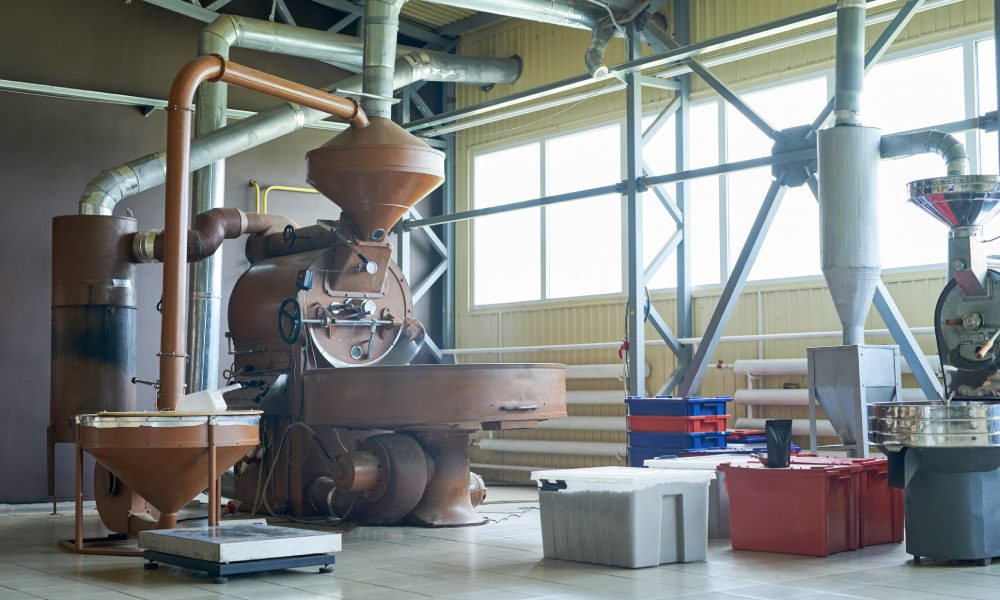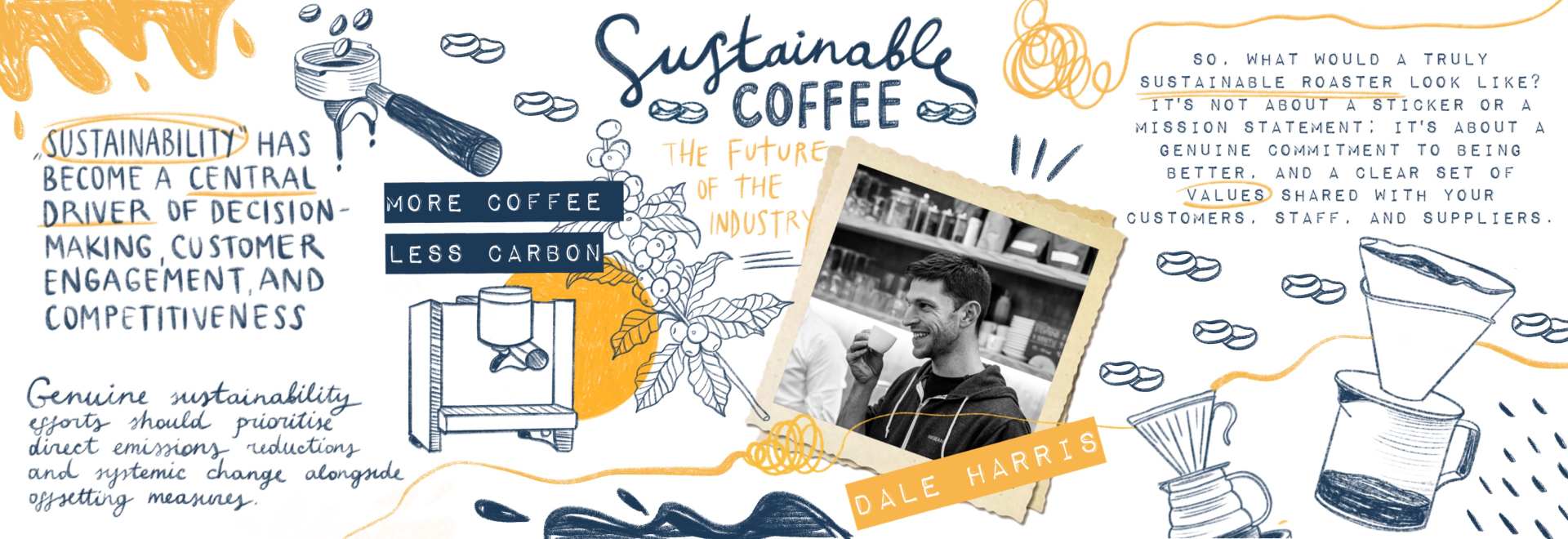Coffee roasters need to band together for the future of the industry
The coffee industry has some big challenges to face. Dale Harris talks about what role coffee roasters have, and dreams of a way forward.
For the greater part of specialty coffee’s formative years, conversations around sustainability were tied to ethical purchasing. We dissected the merits and shortcomings of Fairtrade, extolled the virtues of direct trade, and focussed on a moral high ground of paying more per pound.
It was an acknowledgement of the flaws within the C-market, where prices often dipped below production costs, and an understanding of some of the challenges faced by coffee producers and the responsibility of purchasers.
After 30 years of growth in the specialty coffee movement, these problems still remain with us, and we face many more. The world has changed – along with our awareness of the impact we have on it – and as we grow (and grow up), so does our level of responsibility.
Today, specialty coffee still endeavours to deliver better prices to producers, but must also manage this alongside growing environmental concerns. The true cost of fuel usage has become starkly evident as climate change impacts coffee production, as well as the lives of the countless individuals involved.
Global solutions
Global markets are more connected than ever before, which means that disruptions like pandemics, political instability, and regional conflicts can drive up prices for fuel, fertilizers, and shipping across the world.
These escalating costs not only affect customers’ ability and willingness to pay more, as well as increase the expenses of running a business, but they also challenge the acceptance of globalisation generally – at a time when we need global solutions more than ever.
In every industry, “sustainability” has become a central driver of decision-making, customer engagement, and competitiveness. Coffee, with its extensive global value chain, emotionally charged narratives, and impassioned customers, has the potential to model what corporate responsibility can truly entail.
It feels that every day a roaster launches a new sustainability initiative – from improved packaging to B-Corp accreditation. This is a positive step, but sorting out the marketing from meaningful impact can be hard for someone working within the industry, let alone a customer.
What is a sustainable business?
It’s difficult to understand what a sustainable business is. One might argue that it is a business that produces zero waste. Yet, all roasters inherently generate waste.
Every business that makes a product has a wider impact. A genuinely sustainable business acknowledges these impacts, is transparent about them, and takes active steps to reduce them while enhancing their more positive aspects.
It could be that a sustainable business has a net zero or even a negative carbon footprint. Carbon credits can be bought through offsetting schemes, but this may not truly remove the net impact. The effectiveness of certain offset projects has been questioned, with concerns about their actual impact on reducing greenhouse gasses.
Therefore, while carbon offsetting could be a valuable tool in the broader sustainability toolkit, it should be approached with caution. Genuine sustainability efforts should prioritise direct emissions reductions and systemic change alongside offsetting measures.
Others might posit that only a profitable business can truly be sustainable, and any efforts that impede profitability must come after this critical step. Within the B-Corp movement, this is encapsulated in the mantra “no purpose without profit”.
While true, this can sometimes be used as a justification to avoid addressing issues that come with significant costs, yet it is crucial to recognise that all significant issues do have associated costs. These trade-offs are at the heart of a true sustainability strategy.

A genuine commitment
In my experience, roasting brands often focus on three core areas: power usage, waste management, and employee rewards. These are vital areas to address, but they only scratch the surface.
So, what would a truly sustainable roaster look like? It’s not about a sticker or a mission statement; it’s about a genuine commitment to being better, and a clear set of values shared with your customers, staff, and suppliers. You don’t need to excel in every aspect, but you do need to deliver on your promises.
Wastefulness in fuel, coffee, money, and time are all problems. Shipping goods worldwide, while sometimes exaggerated, is an issue. To acknowledge the greenhouse gas emissions attributed to each of these factors, a Scope 3 report is an excellent place to start. However, its findings should not be treated as gospel because of its inherent reporting complexities, but instead as a guide to areas that need more consideration.
Thought must be given to what could be reduced or deemed unnecessary. This involves examining sourcing choices and the impact at origin – how has that coffee been grown? By whom? What is the effect on the local community, as well as the impact where the business is based? Does it create jobs, and are they good jobs? What about the impact of waste streams, both from the business itself and from its customers?
Ultimately, a sustainable roaster must consider the purpose it serves in the world. What would be absent from the world if it were to disappear, and is that absence truly a negative thing?
In an era where access to freshly roasted, ethically sourced, and climate-neutral coffee is readily available, a truly sustainable roaster must consider what sets it apart from others. This will not only define its future decisions but also begin to pave the way for a more responsible industry.
After working through a number of projects across different businesses, I’m both mindful of the energy and time it takes to make actual changes, and cynical about genuine results.
In general, I appreciate the direction we’re heading in, but I believe there’s an opportunity for us to aim for more ambitious goals in defining sustainability within our industry – and to work with one another to help us achieve them.
Transparency and collaboration
So, what might a sustainable coffee roaster look like?
We should envision one that encompasses economic, environmental, and social impacts in its assessments. Such a roaster would extend its analysis to every resource used and every product’s impact.
Transparency is key, both in areas where information is abundant and where it may be lacking.
A sustainable coffee roaster would be built on the foundation of establishing a sustainable, long-term business that nurtures careers, employing and upskilling individuals from the community it calls home.
It would also forge robust connections with customers based on shared values, leading to enduring relationships that minimize marketing waste.
With a little luck, this approach leads to a profitable business that generates tax revenue for local services and benefits the wider community. A sustainable roaster would also ensure its success is shared equitably with all employees and other supply chain partners.
Resource management would be carefully measured and minimised wherever possible; particularly in relation to fuel consumption, but also packaging, ink, and coffee.
As consumers increasingly demand convenience, this would be carefully considered against the environmental impact of delivering it – and that would be reflected in pricing.
While single-use packaging would be minimised, alternatives would be assessed with a full lifecycle analysis, taking into account their real-world practicality. How much does the manufacture, shipping, and occasional use of a reusable cup cost? Does producing a thousand more printed tote bags truly make the world a better place?
This vision is huge, and not achievable by any one player. It requires teamwork between different stakeholders and competing businesses. Not every roaster needs to be the leader in every area; by being transparent and sharing our best efforts, roasters can enable others to replicate them.
In this way, together, we can build a model of how roasters can truly deliver on our highest aspirations and address some of the challenges we will face in the future.
New Ground Coffee
Want to read more articles like this? Sign up for our newsletter!







